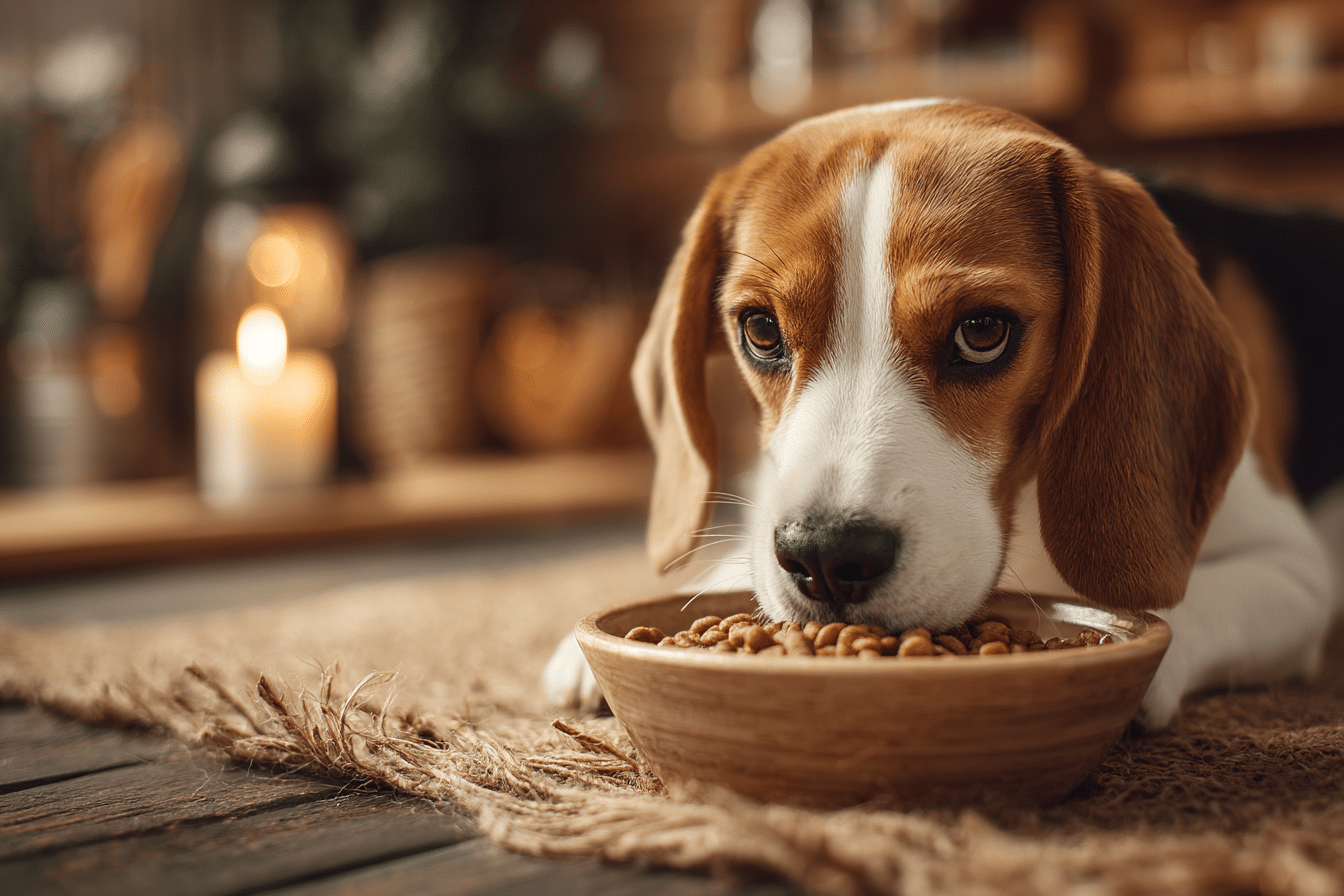Providing your Beagle with the right nutrition is essential for maintaining its energy, health, and overall happiness. These lively and affectionate dogs have specific dietary requirements that support their active lifestyle and unique physiology. Whether you are considering commercial food or homemade meals, understanding the nutritional needs of Beagles will help you craft a diet plan that keeps them thriving throughout every stage of life.
Nutritional Needs of Beagle Dogs
Beagles are medium-sized dogs with a muscular build and high energy levels. Their diet should be well-balanced, offering an appropriate mix of macronutrients such as proteins, fats, and carbohydrates, along with vital vitamins and minerals. Proteins are crucial for muscle maintenance, while fats serve as a dense energy source and aid in healthy skin and coat condition. Carbohydrates provide quick energy and dietary fiber to support digestion.
In addition, Beagles benefit from nutrients like omega-3 and omega-6 fatty acids, antioxidants, calcium, phosphorus, and essential vitamins such as A, D, E, and B-complex. These contribute to immune function, bone health, and overall vitality. Proper nutrition can also help prevent common breed health issues like obesity, ear infections, and joint problems.
Best Commercial Dog Food Options
When choosing commercial dog food for your Beagle, aim for high-quality brands that prioritize natural ingredients and have a balanced nutritional profile. Look for foods labeled as “complete and balanced” by the Association of American Feed Control Officials (AAFCO). These products have met nutritional standards necessary for your dog’s well-being.
Recommended features include:
- Real meat or fish as the first ingredient
- Limited fillers such as corn, soy, and wheat
- Inclusion of fruits and vegetables for antioxidants and fiber
- Essential fatty acids like omega-3 from fish oil or flaxseed
- No artificial colors, flavors, or preservatives
Quality brands tailored for small to medium active breeds are often well-suited for Beagles. Additionally, consider options specific to your dog’s age and any health conditions.
Homemade Diet Ideas and Recipes
Some Beagle owners prefer preparing homemade meals to have full control over ingredients and quality. A homemade diet can be nutritious and delicious when done correctly but requires careful balance to avoid deficiencies.
Basic homemade meal components include:
- Lean protein sources like chicken, turkey, or beef
- Cooked carbohydrates such as brown rice, sweet potatoes, or oats
- Vegetables like carrots, green beans, and spinach (cooked or steamed)
- A small amount of healthy fats, such as olive oil or fish oil
- Calcium supplement, often from ground eggshells or specific additives
Here is a simple recipe example:
- 1 cup cooked lean chicken (chopped)
- 1/2 cup cooked brown rice
- 1/4 cup cooked carrots and green beans
- 1 teaspoon olive oil
- Calcium supplement as per veterinarian’s advice
Always consult your veterinarian or a canine nutritionist before switching to homemade meals to ensure your Beagle receives all necessary nutrients.
Portion Sizes and Feeding Schedules
Beagles have a tendency to overeat if given unlimited access to food, so controlling portion sizes is key to maintaining healthy weight. The exact amount varies depending on your Beagle’s age, weight, activity level, and the food type.
As a general guide, active adult Beagles weighing around 20-25 pounds typically require about 1 to 1.5 cups of high-quality dry dog food per day, divided into two meals. Puppies and senior dogs have different needs and may require more frequent meals with adjusted portions.
Feeding your Beagle twice daily helps regulate their digestion and energy. Establish regular feeding times, avoid free feeding, and monitor their appetite and weight consistently.
Foods to Avoid for Beagles
Some human and pet foods can be harmful or toxic to Beagles. Avoid feeding your dog the following:
- Chocolate, caffeine, and caffeinated products
- Grapes and raisins
- Onions, garlic, and chives
- Alcohol and fermented foods
- Avocado (contains persin, toxic to some dogs)
- Xylitol (artificial sweetener found in gum and candies)
- Cooked bones (can splinter and cause injury)
- Excessively fatty or salty human foods
Keeping these off the menu helps prevent poisoning and digestive problems.
Hydration Tips
Fresh, clean water should be available to your Beagle at all times. Dehydration can affect their health significantly, especially since Beagles are prone to high activity and can easily overheat. In warm weather or after exercise, encourage your dog to drink more by refreshing their water bowl and possibly offering ice cubes as a treat.
If you notice signs of excessive thirst, lethargy, or dehydration such as sunken eyes or dry gums, consult a veterinarian promptly.
Adjusting Diet by Age and Activity
The nutritional requirements of a Beagle change throughout their life stages:
- Puppies: Need nutrient-dense food rich in protein, fats, and calcium to support growth and development. Puppy formulas often include added DHA for brain development.
- Adult dogs: Require balanced nutrition with calories suited to moderate activity levels to maintain healthy weight and muscle.
- Seniors: May benefit from foods lower in calories and fat but enriched with joint-friendly supplements such as glucosamine and chondroitin.
Activity level is another important factor. A working or very active Beagle will need more calories, particularly from fats and protein, compared to a Beagle primarily living indoors with limited exercise.
Monitoring Weight and Health Through Diet
Regularly tracking your Beagle’s weight, body condition, and overall health is essential to adjust diet and prevent obesity—a common issue with this breed. Signs of a healthy weight include visible waist definition from above and the ability to feel ribs without excess fat covering.
If your Beagle is gaining excessive weight, reduce portion sizes, increase exercise, and evaluate treats offered. For weight loss or if you notice any digestive or skin issues, consult your veterinarian to rule out medical problems and redesign the diet accordingly.
Simple Diet Plan Templates for Beagles
Here are sample daily feeding templates to help you get started:
Adult Beagle on Commercial Dry Food
- Morning: 1/2 cup high-quality dry kibble
- Evening: 1/2 cup high-quality dry kibble
- Treats: Healthy dog biscuits or carrot sticks in moderation
- Water: Fresh water available all day
Homemade Meal Plan
- Morning: 1/2 cup cooked lean protein + 1/4 cup cooked vegetables + 1/4 cup cooked rice
- Evening: 1/2 cup cooked lean protein + 1/4 cup cooked vegetables + 1/4 cup cooked sweet potato
- Supplements as advised by your vet
- Water: Fresh water freely accessible
Remember to tailor the portion sizes and ingredients according to your individual Beagle’s preferences, health, and activity.
By understanding the unique dietary needs of your Beagle and committing to a consistent nutrition plan, you can ensure your furry friend enjoys a vibrant and healthy life. Whether you choose commercial foods or homemade recipes, balanced feeding and proper hydration will support their energy, longevity, and happiness at every stage.







